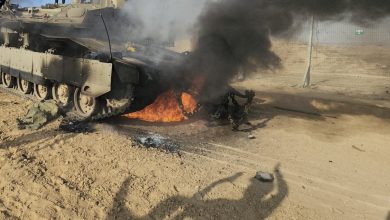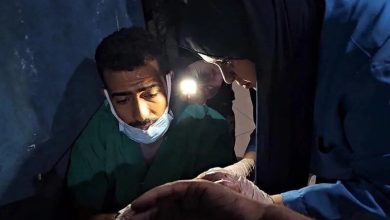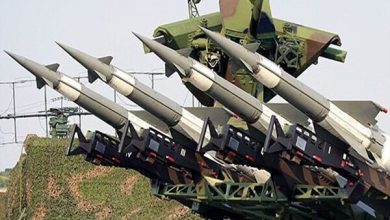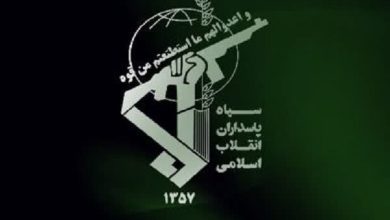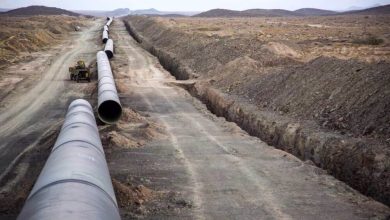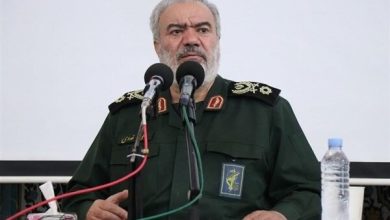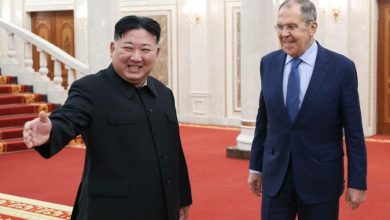Hezbollah Leader Discloses Wartime Strategies in Exclusive Al Mayadeen Interview
Hezbollah's Secretary-General, Sheikh Naim Qassem, has outlined the organization's preparedness in the aftermath of conflict, elucidating their position on Syria and explaining the rationale behind agreeing to a ceasefire following the assassination of Sayyed Hassan Nasrallah.
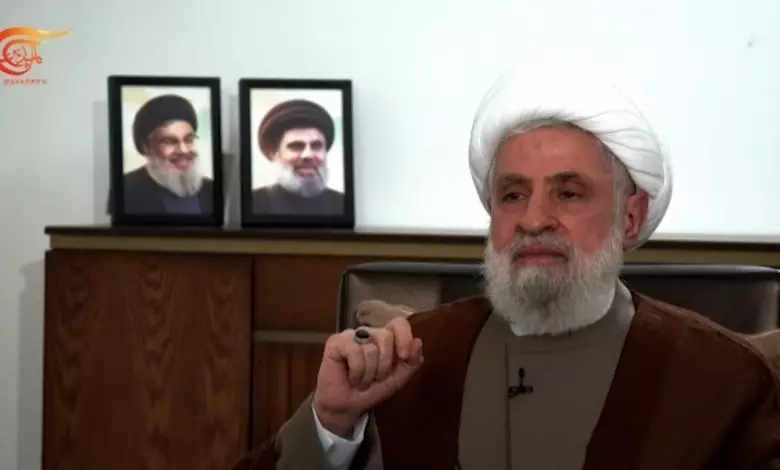
In a recent interview with Al Mayadeen, Hezbollah’s leader, Sheikh Naim Qassem, discussed the group’s strategic decision to participate in the ongoing conflict in Gaza by engaging in a “support battle” instead of committing to a full-scale war. The conversation, led by Al Mayadeen’s board chairman, Mr. Ghassan Ben Jeddou, provided a comprehensive insight into the Resistance’s approach and objectives.
Sheikh Qassem characterized the decision as an outcome of thorough discussions within Hezbollah’s Shura Council, marking a significant juncture in the organization’s strategy towards the Israeli occupation’s conflict in Gaza. He disclosed that the Shura Council had convened and reached a unanimous decision to engage in supporting Gaza. Stressing the gravity of the decision-making process, Qassem stated, “Such a decision cannot be made through phone calls or casual communications. An immediate in-person meeting was essential.” He noted that the decision was made two days into the conflict, which started with Hezbollah’s initial attacks from Shebaa Farms on October 8.
In addressing inquiries regarding Hezbollah’s decision for a restrained support operation instead of a comprehensive war effort, Sheikh Qassem highlighted the necessity of extensive pre-war preparations for such an endeavor. He noted that the consequences of a full-scale war are foreseeable and require a level of readiness that was currently unattainable. Consequently, Hezbollah chose to engage with a calculated approach. Sheikh Qassem elaborated that they needed to engage with limited backing while closely monitoring developments, which would allow for a more informed decision as the situation progressed.
Weeks into the operation, the Shura Council confirmed its commitment to a support war strategy, opting against a comprehensive conflict. Sheikh Qassem reported that this approach effectively met Hezbollah’s strategic goals while avoiding escalation into a full-scale war.
Sheikh Qassem detailed three key objectives underpinning Hezbollah’s involvement: Redirecting Israeli military focus by engaging a substantial portion of Israeli forces in northern occupied Palestine; generating societal pressure with the intention of compelling the evacuation of Israeli settlers from the region, thus instigating social, economic, and security turmoil; and causing military losses, as highlighted by his statement that increased casualties would edge Israel nearer to defeat.
He indicated that these strategies contributed to the reduction of Israeli military resources around Gaza and nearby regions, thereby alleviating the strain on the beleaguered residents of the Strip. “It also conveys a stark message to the Israelis that they are confronting a two-front conflict, and it would be in their favor to seek a resolution and conclude this situation,” he further commented.
Sheikh Qassem asserted that Hezbollah was not involved in any prior coordination with Hamas ahead of the October 7 operation. “We were completely unaware. Without prior knowledge, it would have been impossible for us to engage in a comprehensive conflict from the outset,” he stated.
Hezbollah received a communication from Mohammed Deif, the commander of Hamas’ military wing who has been martyred, through a Lebanese intermediary, according to Sheikh Qassem. Furthermore, discussions took place in Beirut with senior Hamas official Khalil al-Hayya and his delegation during their visit. Sheikh Qassem noted that both Hezbollah and various Palestinian factions, during a meeting with the late Sayyed Hassan Nasrallah, agreed that the support operation was adequate in advancing the wider objectives of the resistance.
“For a span of two months, we evaluated the adequacy of this level of support. However, it became evident that the intensity of Israeli actions was profound, driven by revised engagement protocols and backing from the United States,” he stated. “Exceeding support measures would not have altered the result.”
Sheikh Qassem has stated that, according to his sources, Iran was not forewarned about Hamas’ plans. “In fact, even some leaders of Hamas overseas were not in the loop,” he remarked. Nevertheless, he emphasized Iran’s steadfast support for the Palestinian cause across military, financial, political, intelligence, and media dimensions has persisted without disruption. “Irrespective of whether they informed us, our commitment to supporting Palestine, particularly during this critical phase of the al-Aqsa Flood, remains resolute,” he asserted.
In the latest segment of his exclusive dialogue with Al Mayadeen, Hezbollah Secretary General Sheikh Naim Qassem discussed recent security lapses that have unsettled the organization. He unveiled ongoing internal investigations and disclosed fresh insights regarding the extent and characteristics of the infiltration.
Sheikh Qassem announced that a central investigative committee has been established and remains active, supported by numerous subcommittees that are delving into specific details of the breach. These include the investigation of booby-trapped pagers, the site targeted for Sayyed Nasrallah’s assassination, as well as the assassination of Sayyed Hashem Safieddine. He noted that a variety of monitoring and investigative stations have also been set up.
In a statement addressing the compromised pagers, Sheikh Qassem disclosed that investigations have identified a significant flaw in the procurement procedures over the past twelve to eighteen months prior to the acquisition. “There was no awareness of the supply chain’s vulnerability,” Qassem acknowledged. “Given our resources, it was impossible to discern the presence of explosives.” He highlighted that the explosive device integrated within the pager was sophisticated, rendering standard detection methods ineffective. “This situation may be perceived as either a failure or a reflection of our limited capabilities,” he commented.
In the period leading up to the pager explosion, Hezbollah’s team had already started to suspect a potential malfunction. “Efforts were underway to investigate the pager differently, including attempts to dismantle it, driven by certain anomalies that raised concerns,” Sheikh Qassem stated.
Regarding the possibility that the Israeli regime may have detonated the device due to concerns it might be uncovered, the individual stated, “That’s an Israeli evaluation. Perhaps they were worried we were on the verge of revealing it.”
Sheikh Qassem has admitted a significant oversight in Hezbollah’s understanding of the breadth of Israeli surveillance, especially in the realms of electronics and aerial reconnaissance. He noted that Hezbollah had received intelligence suggesting potential wiretapping activities, but confessed that they had not comprehended the full extent of the surveillance, which was described as nearly complete and highly pervasive.
Sheikh Qassem acknowledged that data collection through aerial surveillance has been conducted by Israel for the past 17 years, focusing on documenting geographical and infrastructural developments. He admitted, “We didn’t have the capacity to grasp how deep Israel’s information gathering had gone.”
Sheikh Qassem emphasized that human espionage has taken a backseat to the advanced technological intelligence employed by Israel. “To be frank, the impact of human infiltration seems minimal when juxtaposed with the vast data amassed through surveillance and drone technology,” he stated.
He categorically rejected claims of extensive human infiltration within Hezbollah, asserting, “There is no indication of any substantial security breach involving key personnel or top commanders.” He emphasized a commitment to transparency, stating, “Should any human penetration be identified, I will make a public disclosure regarding the extent of such a breach.”
Hezbollah’s Sheikh Qassem announced the interception of approximately 1,500 bugged pager devices in Turkiye. The discovery followed an initial pager explosion. Hezbollah promptly informed Lebanon’s caretaker Prime Minister Najib Mikati, who subsequently contacted Turkish President Recep Tayyip Erdoğan, urging the destruction of the devices. “This issue was addressed swiftly after the explosion,” stated Sheikh Qassem.
In response to speculation regarding military armor or protective gear potentially rigged for Hezbollah fighters, Sheikh Qassem clarified, “I have no information to confirm that.”
Sheikh Qassem spoke on the party’s trajectory after enduring months of conflict and the loss of key figures, notably Sayyed Hassan Nasrallah. He highlighted the group’s resilience, unwavering determination, and preparedness to face any forthcoming acts of aggression from Israel.
Sheikh Qassem sought to bolster confidence among supporters, asserting that Hezbollah remains resilient and undefeated despite significant challenges. “A people like this, an Ummah like this, a party and resistance like this, cannot be defeated,” he proclaimed. He questioned whether anyone could expect less than continued strength and influence in shaping the future on their terms.
In response to the assaults aimed at Hezbollah’s sophisticated assets, such as compromised pagers and communication networks, along with the assassination of prominent figures including Secretary-General Sayyed Hassan Nasrallah, Sayyed Hashem Safieddine, and several high-ranking and junior officers, Sheikh Qassem remarked that the Israeli occupation believed Hezbollah would dismantle. “Yet, we stand resilient, engaged in intense combat, compelling Israel to consent to a ceasefire. What does that convey?” he inquired.
He outlined what he termed as the components of success: Hezbollah’s ongoing activities, Israel’s inability to advance further into Lebanese land or to reach Beirut or Sidon, along with the maintenance of Lebanese solidarity. “They were unable to incite internal conflict. They did not succeed in dismantling the group. They failed to accomplish their goals,” he stated.
In response to the increasing aggression of the Israeli occupation, highlighted by recent strikes on Beirut’s southern suburb, Sheikh Qassem issued a cautionary statement regarding Hezbollah’s endurance. He emphasized that “resistance will not wait forever” and acknowledged the existence of limits. Though he did not reveal specific timings or tactics, he asserted that once a decision is reached, the group is resolute, declaring, “there is no third option between victory and martyrdom. Surrender is not within our choices.”
He attributed the intensified actions of the Israeli occupation to United States policy, arguing that Washington seeks to accomplish through diplomatic means what it was unable to secure militarily. “Their approach is: ‘Let’s use diplomacy to achieve what we couldn’t in war.’ Consequently, the Americans exert pressure by leveraging Israel,” he stated.
Sheikh Qassem commended Lebanese leaders for their solidarity, stating, “I applaud President Joseph Aoun, Speaker Nabih Berri, and all officials engaged in this exceptional demonstration of national unity.”
In poignant and heartfelt comments, Sheikh Qassem expressed profound grief over the loss of Sayyed Hassan Nasrallah, describing it as a significant blow to both the public and Hezbollah’s hierarchy. “His martyrdom was not anticipated by anyone, including us,” he stated. “Had you asked me earlier, I would have believed that any one of us might fall before Sayyed Nasrallah. That’s the extent of his strength, courage, and divine guidance.”
“It was difficult to envision his departure,” he stated. “Maybe this was part of a divine mystery. We do not know the timing of our own fate. However, he has earned his peace and ascended to the highest echelon. We regard martyrdom as the utmost honor, and he achieved the highest accolade.”
Sheikh Qassem recounted the moment he became aware of the assassination, initially experiencing disbelief. “At first, I couldn’t accept it. I hoped the reports were false, perhaps he wasn’t targeted, maybe he had survived elsewhere. However, the following day, confirmation came from the brothers that the body had been recovered. That’s when the reality became undeniable,” he stated.
The primary challenge at present, according to Sheikh Qassem, lies in moving forward without a leader whose unique strength, tone, energy, and position were unparalleled. “We do not weep because he is no longer with us, but because we struggle to fill the void he left behind,” Sheikh Qassem remarked. “However, martyrdom does not halt the journey; it strengthens and sustains it.”
“We are tasked with upholding this mission to the extent of his sacrifice. With earnestness and determination, we seek divine assistance in shouldering this duty.”
Sheikh Qassem provided insights into the tumultuous period after Sayyed Hassan Nasrallah’s assassination, detailing his initial public address, the challenges of leadership, and Hezbollah’s adaptation to a new leadership framework amid intense pressure.
Following the assassination of Sayyed Hashem Safieddine, Sheikh Naim Qassem officially stepped into the position of Secretary General, taking on the direct oversight of Hezbollah’s military operations. He revealed that soon after assuming leadership, he was questioned by an Iranian military leader and a Lebanese commander, who were not part of Hezbollah, regarding his strategy for managing a military campaign.
Sheikh Qassem elaborated that by virtue of the party’s organizational framework, the Secretary-General holds the position of head of the Jihadi Council, charged with overseeing military operations. “With my new responsibilities, it was imperative to enhance communication with key commanders and gain a deeper insight into operational specifics,” he stated.
He outlined three crucial qualifications for heading Hezbollah and its resistance efforts: effective organizational and leadership skills, a thorough comprehension of Hezbollah’s mission and strategic objectives, and knowledge of the party’s structure, resources, and internal dynamics. “All of these factors were evident,” he asserted, emphasizing his 32-year tenure as deputy and active participation in the Shura Council during that time.
Sheikh Qassem provided an uncommon glimpse into Hezbollah’s military decision-making framework, stressing that significant decisions, including the appointment of unit leaders and the initiation of operations, are determined collectively by the Shura Council. “No appointment is made without thorough discussion,” he stated.
He noted that any proposed military operations, like the Qalamoun campaign or Hezbollah’s involvement in Syria, along with any plans to respond to Israeli actions, are consistently reviewed by the council. “We might present our plan, with the Jihadi Council recommending this approach. Should we conduct a strike this way? Deploy a drone? Launch a rocket? Every step undergoes internal discussions,” he stated.
Sheikh Qassem emphasized that Hezbollah maintained its operational structure despite facing intense assaults. “Hezbollah operated as though it still had a secretary general, with decision-making firmly in the hands of its leadership,” he stated.
He outlined the process behind operational decisions for each escalation. He explained that the directive was unique for the attack on Tel Aviv, and a separate order was issued for the strike on Netanyahu’s residence. The significant event on November 24, known by adversaries as ‘Black Sunday,’ involved launching 370 rockets and drones in a single day, also decided through a formal directive.
Sheikh Qassem underscored that the attack on Tel Aviv was a carefully orchestrated operation, guided by strategic planning and authoritative supervision. He highlighted that the Secretary-General maintained close monitoring of the unfolding events via the military command. This reference was made to the late martyr Sayyed Nasrallah, who provided strategic oversight up until the final moment.
He characterized the military command structure during the strike as fully operational, affirming that, “Every position in the military command was filled. No seat was left vacant.” He also noted that contingency plans were swiftly enacted following any leadership losses.
Sheikh Qassem affirmed that while Iran had offered valuable consultations, the strategic decisions regarding Hezbollah’s military operations were autonomously determined within their organizational framework. He expressed appreciation for the Iranian guidance but emphasized the independence of their internal decision-making processes.
He highlighted an example to demonstrate the degree of coordination, pointing to the timing of his third public address, which was promptly succeeded by the Tel Aviv strike. “How could these events occur consecutively without a meticulously prearranged plan?” he questioned rhetorically.
Sheikh Qassem has reflected on the performance on the battlefield, highlighting the “legendary resilience” demonstrated, which he attributed to two primary factors. “Firstly, the young fighters positioned there showed remarkable understanding and maintained their positions even when communication was severed. Their actions were nothing short of heroic,” he stated.
“The second component was the external support, which we refer to as the bombardment,” he stated, alluding to the missile and drone attacks initiated by Hezbollah in aid of frontline troops. He reassured the public that despite the challenges, Hezbollah’s presence remained active and coordinated. “Fighters kept reaching pivotal locations like the southern town of Khiam until the very end,” he disclosed. “It’s true there were areas beyond our reach, but not everything was cut off.”
When questioned about Hezbollah’s current capabilities, both human and otherwise, to sustain its efforts, Sheikh Qassem opted not to reveal specific figures or percentages concerning losses or remaining strength. Instead, he provided a brief yet resolute statement, affirming, “Hezbollah is rebuilding, recovering, and ready now.”
He stated, “Should Israel launch an attack, we would not remain passive; we would actively engage in the fight.”
In response to assertions that 500 weapons storage sites belonging to Hezbollah have been destroyed south of the Litani River, Sheikh Qassem cryptically noted, “They are referencing the area south of the Litani. However, the country is expansive,” and chose not to provide additional details.
Sheikh Qassem revisited pre-war discussions, emphasizing that martyr Sayyed Nasrallah had openly declared Hezbollah’s lack of interest in war. Notably, a French-American proposal advocating for a 21-day ceasefire in Lebanon, distinct from the situation in Gaza, was already in circulation prior to the onset of the wider conflict.
According to Qassem, a joint statement from France and the United States was issued on September 25 detailing a proposal. As media coverage and diplomatic talks progressed, Sayyed Nasrallah conveyed to Speaker Nabih Berri, via Hezbollah MP Hussein Khalil, that Hezbollah was amenable to the concept of a ceasefire, contingent upon the potential for enhancement of the proposal through negotiations, he elaborated.
Two days following the assassination of Sayyed Nasrallah, the dynamics of the situation shifted significantly. In response to the Israeli escalation, Hezbollah initiated Operation “People of Might.” Sheikh Qassem revealed that the operation’s name was partially inspired by martyr Mohammad Afif, who had sent Sheikh Qassem a list of suggested titles.
He highlighted that Hezbollah has not committed to launching a full-scale war, choosing instead to respond solely to Israeli actions. “Should the enemy cease its activities, we are prepared to halt as well. The conflict was initiated by them, not us,” he stated.
Sheikh Qassem stated that the military campaign effectively stopped the Israeli occupation’s progress and thwarted its goals. He noted that extending the conflict would have resulted in a war of attrition with no valuable outcome. “At that juncture, the battle could have become purposeless, ultimately leading us to negotiations,” he remarked. “Thus, on November 24, a ceasefire was agreed upon since the adversary had also concurred.”
The accord was brokered by United States envoy Amos Hochstein, who delivered a draft proposal to Speaker Nabih Berri. Hezbollah examined the proposal, made revisions through Berri, and the agreement was ultimately finalized with unanimous consent from Hezbollah’s Shura Council.
Qassem indicated that the agreement received backing from Hezbollah’s frontline leaders, stating, “They recognized this as the right proposal at the appropriate moment, following a period of wear and tear.”
Sheikh Naim Qassem has categorically dismissed two dominant narratives regarding the movement’s recent decision to agree to a ceasefire with Israel. These narratives suggest that Iran exerted pressure on Hezbollah to reach this agreement and that the central leadership was oblivious to the remarkable resilience exhibited by its fighters on the southern front.
Sheikh Qassem asserted the improbability of a ceasefire taking effect precisely at 4 o’clock, with seamless adherence from all levels, without an established and cohesive command structure executing orders. He highlighted that Hezbollah’s military discipline effectively counters the narrative of disconnection from its field units.
In addressing Iran’s involvement, Qassem clarified the situation unequivocally, stating, “Iran never requested us to agree to a ceasefire. We communicated our decision to them, but it was wholly ours. It was a decision made by Lebanon, initiated by Hezbollah and Amal. Even the Lebanese government accepted the agreement via indirect negotiations.”
Sheikh Qassem disclosed that at the onset of the Gaza conflict, Hezbollah initiated its support operations autonomously, relying on its evaluation of capabilities and strategic timing. Initially, some within the Palestinian factions perceived the support as inadequate; however, they eventually recognized its significance.
In addressing Iran’s involvement in the wider regional conflict, Sheikh Qassem highlighted Tehran’s strategic caution. He noted that Iran recognized that direct participation in the war could provoke a confrontation with the United States, ultimately serving Israel’s interests by escalating the conflict into a larger war with American support.
Iran has strategically opted to extend crucial financial, military, political, and media backing to the Axis of Resistance. “Iran did everything it could and beyond,” stated Qassem. “We never requested Iran to join the conflict, nor was there any need for such a request. Its support forms the cornerstone of our resilience and that of the entire resistance.”
He emphasized that direct military involvement is not the sole way to provide significant assistance, stating, “Participation manifests in various forms. Iran implemented what was most crucial, and it proved to be highly effective.”
Sheikh Qassem disclosed the extent of focus Iranian Leader Ayatollah Sayyed Ali Khamenei placed on the circumstances in Gaza and Lebanon. According to Qassem, Khamenei received daily briefings from the IRGC, Iranian intelligence, and media, closely monitoring developments. He reportedly instructed his officials to provide support, maintain engagement, and stand in solidarity with them.
“What more could we ask for?” he remarked. “The flow persisted despite damage to some of the canals. However, if the source dries up, it poses a genuine issue. Nevertheless, the source, Imam Khamenei’s dedication, remains unwavering.”
Hezbollah Secretary General Sheikh Naim Qassem has voiced a frank evaluation of the regional dynamics, characterizing the potential fall of the Syrian government as an unequivocal setback for the Axis of Resistance. He emphasized Syria’s previous role as a crucial logistical and political conduit for Palestinian armed groups and resistance entities.
Sheikh Qassem remarked that the events in Syria marked a significant setback for the Axis of Resistance, highlighting the country’s role as a crucial conduit for military support. He noted that during that period, Damascus actively provided tangible aid to Palestinian factions, enabling the transfer of weapons and supplies.
He stated that the Syrian government, before its downfall, maintained a clear political position opposing the Israeli occupation, which enhanced its importance to the Axis of Resistance. The decline of this role, he noted, had repercussions not only in Lebanon but also in Gaza, where resistance forces had depended on Syrian support in various capacities.
The leader of Hezbollah has voiced doubts about Syria’s political trajectory, stating, “We still cannot clearly read what the shape of the future Syrian system will be.” This statement highlights crucial concerns over whether the nation will develop a comprehensive political system or come under the dominance of a single group that marginalizes other communities and movements. Sheikh Qassem further cautioned about potential ongoing instability: “Thousands of Alawites and others were killed by groups connected to the regime. This poses a serious threat to any efforts at rebuilding a stable national framework.”
In a recent statement, Sheikh Qassem of Hezbollah emphasized that the group maintains “no connection to the internal situation in Syria” in the aftermath of the regime’s collapse. However, he expressed hope that the Syrian people will eventually establish a unified and independent government capable of opposing the Israeli occupation.
In light of recent indications of Syrian normalization with Israel, Sheikh Qassem has issued a strong cautionary message, labeling such developments as “extremely dangerous.” He underscored that any steps by Syria towards engagement with Israel would constitute a betrayal of its resistance legacy. Despite this, he expressed strong faith in the people of Syria, stating, “Our confidence in the Syrian people is high. We believe they will reject normalization, although the manner in which they choose to do so is their prerogative, not ours.”
Hezbollah’s Deputy Secretary-General Sheikh Qassem has reaffirmed the group’s steadfast opposition to the normalization of relations with Israel, regardless of whether such efforts are pursued by Syria or other Arab countries. Qassem emphasized that shaking hands with Israel would not halt its aggressive actions, labeling such expectations as illusory. He criticized Israel for its ongoing occupation of the Golan Heights and frequent military strikes within Syria, pointing out that the Israeli regime has seized 600 square kilometers of Syrian territory and significantly weakened the Syrian army, yet continues its demands and attacks unabated.
Sheikh Qassem concluded his remarks by issuing a pointed warning, describing Israel as a “predatory entity” characterized by expansionist ambitions and an insatiable, criminal nature. He accused Israel of having no qualms about committing acts of mass killing, portraying it as a “rampaging beast” that is supported by what he termed the “greatest tyrant,” the United States.
His comments reflect Hezbollah’s steadfast belief that resistance, rather than appeasement or normalization, is the only effective strategy against the Israeli occupation. The group maintains that regional actors considering alternative approaches are engaging in a dangerous gamble.
In his ongoing discourse on regional matters, Hezbollah Deputy Secretary General Sheikh Naim Qassem has unequivocally dismissed claims that the organization plays a role in shaping or influencing the internal resistance movement in Syria. He emphasized that while Hezbollah fundamentally opposes normalization with the Israeli occupation, it will not directly involve itself in Syria’s internal affairs.
In response to an inquiry about whether Hezbollah’s stance against normalization was solely theoretical or if it would entail tangible actions within Syria, Sheikh Qassem clarified, “We will not engage on the ground to alter the course of the Syrian regime. Our position has no bearing on that. Our opposition to normalization remains theoretical.”
He emphasized that Hezbollah maintains no associations with any existing Syrian factions professing to be part of the resistance. “Whether they refer to themselves as ‘the Resistance’ or ‘the People of Valor,’ they might be drawn to the title or have received a suggestion, but we hold no affiliations with them. We possess no structured resistance initiative within Syria,” he stated.
He noted that during previous border incidents in Lebanon’s Hermel region, Hezbollah made a clear effort to dissociate itself from the occurrences and worked in collaboration with the Lebanese Army to maintain governmental authority.
Sheikh Qassem emphasized Hezbollah’s total disengagement from the Syrian regime and any military factions operating within Syria. He clarified that the responsibility for border issues lies with the army and stated, “We are not participating in the coastal developments in Syria, nor are we involved in defining Syria’s governmental structure or the presence of resistance activities there.”
Hezbollah reaffirmed its position on Syria, stating it is articulated solely through political channels. They stressed that the responsibility rests with the Syrian populace, asserting that it is the Syrian people who hold the decision-making power.
Sheikh Qassem addressed the issue of contact with the new Syrian administration, stating, “There was no direct communication. There were some very limited, indirect attempts by ground-based groups, but they didn’t lead anywhere.” He disclosed that shortly after the fall of the Assad regime, certain individuals connected to Hezbollah, who had links with other groups, began informal discussions. However, these efforts soon lost momentum, with no substantial dialogue taking place.
Sheikh Qassem has addressed the increasing speculation regarding Syria’s new leadership potentially being leveraged against Hezbollah. He stated, “We have the right to be cautious. We’ve received reports from both Western and Arab countries suggesting that such ideas exist, that someone wants the new Syrian regime to serve a role in destabilizing Lebanon.”
In a cautionary statement to Lebanese authorities, he emphasized the need for vigilance, highlighting that while some nations express supportive rhetoric towards Lebanon, they fail to provide tangible assistance, all while intending to use Syria as a strategic advantage against Lebanon. He further noted that certain regional and international entities are investigating possibilities to revive past frameworks of Syrian influence over Lebanon, albeit under a new pretense. He remarked that just as Syria previously exerted control over Lebanon, occasionally aligning with foreign interests, there are efforts underway by some stakeholders to replicate that historical scenario with a revamped approach.
Sheikh Qassem emphasized the critical need for political vigilance, stating, “We hope these concepts remain purely theoretical and never come to fruition. It is essential for Lebanese political leaders to remain cautious of those who make promises without follow-through.”
The interview took place on the occasion of the 13th anniversary of the Al Mayadeen network, during which Sheikh Qassem extended his warm congratulations to the network’s team and audience. “They have managed to observe and understand truths that prevent them from being swayed by false sources,” he remarked.

